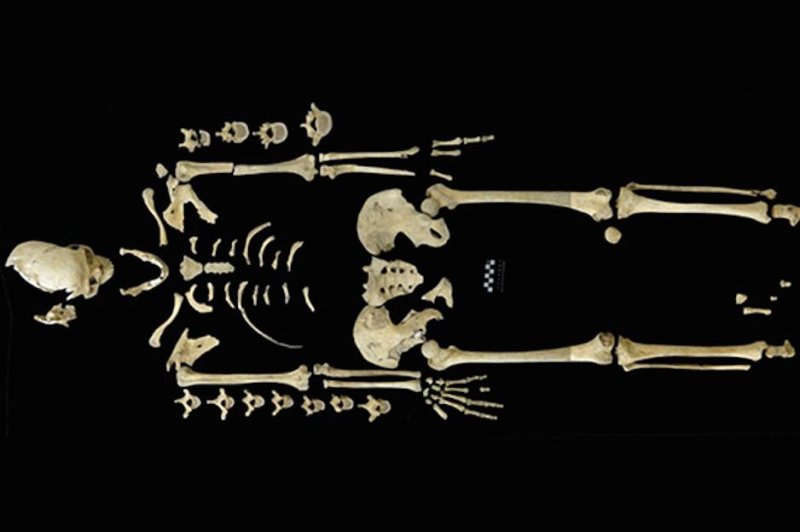The 7,000-year-old evidence of leukemia. Photo by M. Francken/Universitat Tubingen
TUBINGEN, Germany, Aug. 31 (UPI) -- Researchers in Germany have found what they believe to be the oldest case of leukemia. Evidence of the disease was discovered in the bones of 7,000-year-old human skeleton, unearthed at a Neolithic site in southwest Germany.
The remains belong to a woman, about 30 to 40 years old. She was part of an early civilization called the Linear Pottery culture, or LBK. These early farmers settled across Central Europe between 5500 and 4500 BCE, producing pottery marked by distinctive linear decorations.
Infectious disease and malnutrition were common among these early farmers -- and that's in the good years. Poor farming seasons often precipitated violence between neighboring settlements.
But the woman of interest -- analyzed by researchers from Senckenberg Center for Human Evolution and Paleoenvironment and the University of Tubingen -- showed no signs of infection or nutrient deficiency. Instead, researchers found evidence of bone cancer.
"We examined several bones of the skeleton with our high-resolution computed tomography system, and we found an unusual loosening of the interior bone tissue -- the cancellous bone -- in the upper right humerus and the sternum," lead researcher Heike Scherf said in a press release.
The researchers say they can rule out osteoporosis, as such a condition would also exhibit symptoms in other bones. Scientists also compared the woman's shin bone to those of other skeletons from the same settlement, but no other specimens showed similar signs of deterioration.
"None of the other specimens showed this significant pattern," Scherf added. "Even though they come from the same site and belong to the same age group."
The evidence suggests an early incidence of leukemia -- the oldest ever. Though researchers can't confirm that the woman actually died from the cancerous growth.
The researchers presented their findings in August to first European conference on evolutionary medicine, held at the University of Zurich.
"Based even on such state-of-the-art imaging, one can never be 100 percent sure about such a paleopathological finding," Frank Ruhli, director of Zurich's Institute of Evolutionary Medicine, who did not participate in the study, told Discovery News.
"That said, to have an indication for the oldest paleopathological record of a modern, frequent disease with a major impact such as leukemia is very important from the perspective of the evolution of the disease," Ruhli said.















